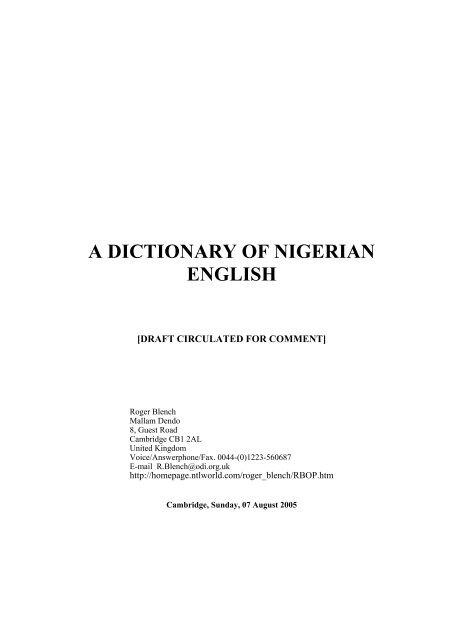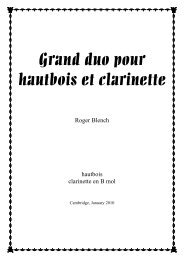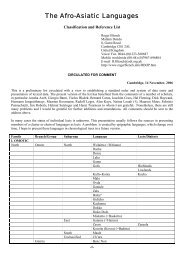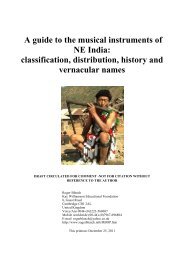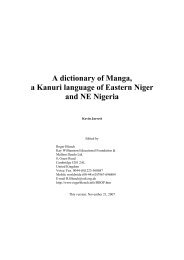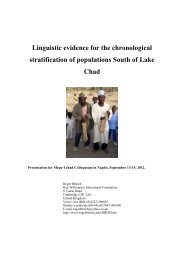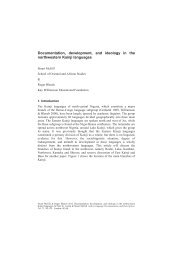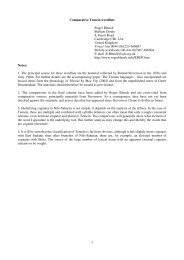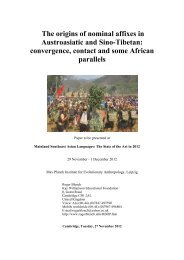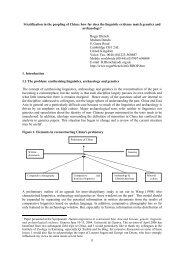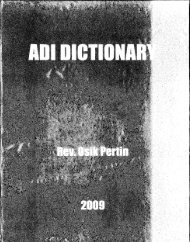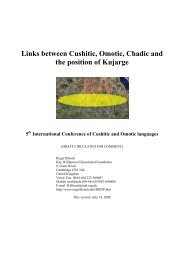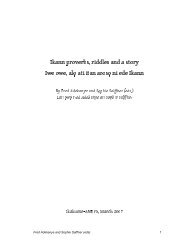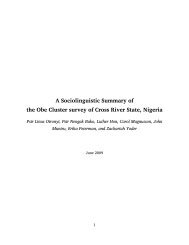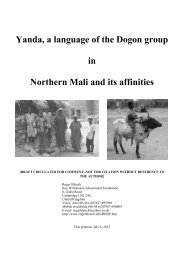A DICTIONARY OF NIGERIAN ENGLISH - Roger Blench
A DICTIONARY OF NIGERIAN ENGLISH - Roger Blench
A DICTIONARY OF NIGERIAN ENGLISH - Roger Blench
You also want an ePaper? Increase the reach of your titles
YUMPU automatically turns print PDFs into web optimized ePapers that Google loves.
A <strong>DICTIONARY</strong> <strong>OF</strong> <strong>NIGERIAN</strong><br />
<strong>ENGLISH</strong><br />
[DRAFT CIRCULATED FOR COMMENT]<br />
<strong>Roger</strong> <strong>Blench</strong><br />
Mallam Dendo<br />
8, Guest Road<br />
Cambridge CB1 2AL<br />
United Kingdom<br />
Voice/Answerphone/Fax. 0044-(0)1223-560687<br />
E-mail R.<strong>Blench</strong>@odi.org.uk<br />
http://homepage.ntlworld.com/roger_blench/RBOP.htm<br />
Cambridge, Sunday, 07 August 2005
TABLE <strong>OF</strong> CONTENTS<br />
Abbreviations...................................................................................................................................................ii<br />
Preface ..............................................................................................................................................................ii<br />
Introduction .....................................................................................................................................................1<br />
Sources..............................................................................................................................................................1<br />
Spelling .............................................................................................................................................................1<br />
Nigerian English/West African English.........................................................................................................1<br />
Pidgin versus Nigerian English ......................................................................................................................1<br />
Auxiliaries ........................................................................................................................................................2<br />
Student slang....................................................................................................................................................2<br />
Pronunciation spellings ...................................................................................................................................2<br />
Re-interpretation of pidgin.............................................................................................................................3<br />
Style versus substance .....................................................................................................................................3<br />
From NE to SE.................................................................................................................................................4<br />
Spelling pronunciation ....................................................................................................................................4<br />
Missionary English ..........................................................................................................................................4<br />
Scientific names, and trade names .................................................................................................................4<br />
Regional variation ...........................................................................................................................................4<br />
Phonology .........................................................................................................................................................5<br />
Parts of Speech.................................................................................................................................................5<br />
References ........................................................................................................................................................6<br />
B. .......................................................................................................................................................................2<br />
C. .......................................................................................................................................................................5<br />
D. .......................................................................................................................................................................7<br />
E. .......................................................................................................................................................................9<br />
F.........................................................................................................................................................................9<br />
G......................................................................................................................................................................10<br />
H......................................................................................................................................................................12<br />
I. ......................................................................................................................................................................13<br />
J. ......................................................................................................................................................................14<br />
K......................................................................................................................................................................14<br />
L. .....................................................................................................................................................................15<br />
M. ....................................................................................................................................................................16<br />
N. .....................................................................................................................................................................18<br />
O......................................................................................................................................................................18<br />
P.......................................................................................................................................................................19<br />
Q......................................................................................................................................................................22<br />
R. .....................................................................................................................................................................22<br />
S.......................................................................................................................................................................23<br />
T. .....................................................................................................................................................................25<br />
U. .....................................................................................................................................................................27<br />
V. .....................................................................................................................................................................27<br />
W. ....................................................................................................................................................................27<br />
X. .....................................................................................................................................................................28<br />
Y. .....................................................................................................................................................................28<br />
Z. .....................................................................................................................................................................28<br />
Numbers .........................................................................................................................................................29<br />
i
Abbreviations<br />
Preface<br />
AE African English<br />
Amer. American (for Americanisms)<br />
arch. archaic<br />
dial. dialect<br />
et. etymologically<br />
euph. euphemism<br />
fig. figurative<br />
hum. humorous<br />
id. idiom<br />
ideo. ideophone<br />
ins. insulting<br />
joc. jocular<br />
lit. literally<br />
NE Nigerian English<br />
NNE Northern Nigerian English<br />
SE Standard English<br />
SNE Southern Nigerian English<br />
sc. sl. schoolboy slang<br />
st. sl. student slang<br />
TE Tropical English<br />
This dictionary of Nigerian English was stimulated by some enquiries from the Oxford English Dictionary<br />
on words of putative West African origin. The OED faces an increasingly uphill struggle in its attempts to<br />
capture World English; almost every Anglophone country has now developed a set of distinctive uses, some<br />
more divergent than others. It is surprising, however, that Nigerian English has never been the subject of a<br />
published dictionary; rumours abound of mighty manuscripts, but these have yet to see the light of day. A<br />
recent publication by Igboanusi goes some way towards remedying this deficiency but the inclusion here of<br />
many words not in his dictionary indicates how much work is still to be done.<br />
The present manuscript is a draft of a document that will eventually, I hope, become a collective product. I<br />
doubt that one individual could produce anything very comprehensive; Nigeria is too diverse and<br />
regionalised. But it seems sensible to lay down an initial marker; then additions can be made. I am<br />
circulating this to individuals I know have an interest; but please send any further information, comments,<br />
emendations etc. to the email or address given on the title page.<br />
ii<br />
<strong>Roger</strong> <strong>Blench</strong><br />
Cambridge<br />
Sunday, 07 August 2005
Dictionary of Nigerian English<br />
Introduction<br />
Circulation Draft <strong>Roger</strong> <strong>Blench</strong><br />
These notes are intended to raise some issues on sources, interpretation and the definition of Nigerian<br />
English.<br />
Sources 1<br />
One of the most difficult issues in lexicography is documenting usages in a semi-written language. If<br />
dictionaries of indigenous African languages are prepared they usually depend entirely on oral sources and<br />
thus no specific justification is given for entries. However, Nigerian English is sometimes written, especially<br />
in newspapers and magazines, and thus has some sort of orthographic tradition. Nonetheless, many of the<br />
most picturesque expressions are strictly oral and must still be captured in the present document. Although<br />
previous studies in this direction have tended to cite novels or literary works (notably Jowitt 1991) these are<br />
sometimes unrepresentative of the spoken language. I have therefore used newspaper, notices and overheard<br />
speech as sources. Example sentences not specifically sourced should be treated as based on the author’s or<br />
his correspondents’ experiences.<br />
Spelling<br />
Nigerian English is printed regularly in the newspapers and since much of it consists of using SE in<br />
extended senses spelling is generally not a problem. Some forms of pidgin origin such as ‘done’ have<br />
conventional representations, e.g. ‘don’. However, others, such as ‘rubber’ are pronounced in a variety of<br />
forms, such as rçba, rUba etc. depending on sociolinguistic considerations. To capture this, I have written<br />
phonologised pronunciations in square brackets after head entry. Thus;<br />
leather [lεda]<br />
Nigerian /Ghanaian/ West African English<br />
One of the more surprising things about Nigerian English is the extent to which it has a common lexicon and<br />
grammar with other West African Englishes, notably Ghanaian. A guide to Ghanaian English (Kirby 1998)<br />
provides an interesting comparison with the present document and parallel forms are noted 2 . I have less<br />
information about Cameroun, Sierra Leone and Gambia and would welcome further insights. However, the<br />
puzzle is the history of some of these forms. Do they go back to the early days of colonial presence on the<br />
coast or are they more recent products of the massive migration of Ghanaians to Nigeria during the oil-boom<br />
era of the 1970s and 1980s? Probably both, but only a detailed scanning of earlier sources will provide<br />
answers.<br />
Pidgin versus Nigerian English<br />
Nigerian English is regarded as distinct from Pidgin English, although the exact location of the boundary<br />
between them differs from speaker to speaker. Some expressions are regarded as strictly Pidgin, for example<br />
pickin for 'child' and sabi for 'to know'. I have thought it best to be quite inclusive, but no doubt some of the<br />
entries will be questioned.<br />
1<br />
Thanks to Philip and Vicky Ostien and especially to Kay Williamson for many useful suggestions.<br />
2<br />
Prof. Mary Esther Kropp-Dakubu of Legon University has kindly gone through the draft text and marked all those<br />
entries which also have parallels in Ghanaian English.<br />
1
Dictionary of Nigerian English<br />
Auxiliaries<br />
Circulation Draft <strong>Roger</strong> <strong>Blench</strong><br />
Often the distinctiveness of Nigerian verbs in use consists of unusual auxiliaries applied to conventional<br />
verbs. Some of these are as follows;<br />
done<br />
he done go he went [Pidgin!]<br />
got<br />
the thing got spoiled<br />
the water got finished<br />
has<br />
he has go he went [just imperfect learning, not standard]<br />
use to<br />
he use to come here he comes here regularly [back formation from used to]<br />
Student slang<br />
Schools and universities are good but extremely localised sources of slang; Ibadan University in particular<br />
seems to have been an important source of unusual expressions. Indeed a small book was published of these<br />
expressions when Ibadan was the only university (Opara & Oleghe 1956). Asomugha (1981) began life as a<br />
compendium of student slang but was enlarged to take in some more mainstream Nigerian English<br />
expressions. Such expressions are often highly localised in time and place; few expressions mentioned in<br />
this book appear to be still in use. Where a term seems to be student slang I have noted it; this is a rich and<br />
distinct field. Kay Williamson (p.c.) has supplied a number of expressions currently (2002) in use in the<br />
University of Port Harcourt, but it is difficult to know how widespread these are.<br />
Tropical English<br />
There are numerous terms which may be termed ‘Tropical English’; unknown to most speakers of SE, they<br />
are nonetheless not specific to Nigeria, but are nonetheless widely used across the Anglophone tropics. This<br />
is very common in pan-tropical plants, for example ‘oil-palm’ or ‘yam-mound’. I have marked these in the<br />
text as TE.<br />
Pronunciation spellings<br />
These are spellings which arise because two English words are pronounced alike by Nigerians and the two<br />
spellings, which reflect different pronunciations for SE speakers, get confused or treated as equivalent. Most<br />
are nonce-forms, but the following examples are typical.<br />
2
Dictionary of Nigerian English Circulation Draft <strong>Roger</strong> <strong>Blench</strong><br />
She feels her life to be sleeping away from her finger. SE [slIpIN] and [sli:pIN] merge as NE<br />
[slipiN]<br />
He is well vast in the Igbo proverbs. SE [v‰:st] and [va:st] merge as NE [vast]<br />
…to deep his hand in the bag SE [dIp] and [di:p] merge as NE [dip]<br />
…capable of performing impossible fits SE [fIt] and [fi:t] merge as NE [fit]<br />
She turned out to develop cold fit for the husband when the<br />
going became bad.<br />
SE [fIt] and [fi:t] merge as NE [fit]<br />
Nigerians from all works of life … SE [w‰k] and [wO:k] merge as NE [wOk]<br />
Pack your car here. SE [pœk] and [pA:k] merge as NE [pak]<br />
laddle<br />
Source: Kay Williamson<br />
reflects the common Nigerian<br />
pronunciation [ladEl]<br />
Portmanteau words<br />
The portmanteau word, first introduced by Lewis Carroll as a humorous excursus of Humpty-Dumpty, is a<br />
lexical reality in Nigeria. Two sound-alikes are combined into a single form as the following examples<br />
show;<br />
impressionario is a common written form of impressario, presumably a portmanteau form ‘impressario’ +<br />
‘impression’<br />
virgina common spelling of vagina presumably by re-interpretation from virgin<br />
Re-interpretation of Pidgin<br />
An interesting process is the movement from Pidgin back into Nigerian English through relexicalisation. For<br />
example;<br />
Pidgin de ting no gree boil the liquid will not boil<br />
NE the kettle did not agree to boil the kettle won’t boil<br />
The pidgin expression is primary and it has been re-expressed by a speaker who sees the second formulation<br />
as more prestigious.<br />
Style versus substance<br />
The most comprehensive sources for Nigerian English prior to this are Jowitt (1991) and Igboanusi (2002).<br />
When native English speakers try to characterise Nigerian English it is clear that their personal perceptions<br />
play an important role in determining which lexical items or usages are distinctive. For example, Nigerian<br />
newspapers often use the stereotyped expression ‘men of the underworld’ to refer to criminals. This would<br />
be unlikely to occur in a current British newspaper, and has an archaic or jocular feel to it. Still, it is<br />
perfectly comprehensible to a speaker of standard English and the component words show no significant<br />
lexical deviation from their normal meanings. Contrast this with ‘area-boys’, also referring to criminals,<br />
which would have no meaning to a speaker of Standard English. Thus, although I have carefully been<br />
through the previous sources, I have excluded many entries that seem to be matters of style rather than true<br />
lexical difference.<br />
3
Dictionary of Nigerian English<br />
From NE to SE<br />
Circulation Draft <strong>Roger</strong> <strong>Blench</strong><br />
A similar process occurs where NE is being relexicalised to SE by certain speakers. Generally speaking, the<br />
newspapers, formerly a great source of NE expressions, have become closer to SE since the 1980s, almost<br />
certainly due to greater exposure to SE forms through the dissemination of news magazines such as Time<br />
and Newsweek. For example; ‘hotel’ is commonly applied to bars and drinking places that serve food but<br />
may have no lodging and ‘hotel’ in the SE sense is ‘guest hotel’. But modern usage is gradually replacing<br />
this so that NE is coming to conform to SE.<br />
Spelling pronunciation<br />
Nigerian English has one or two distinctive spelling-pronunciations, the most characteristic of which is to<br />
always pronounce written ‘ch’ as /tS/ even when Standard English has /S/. Two common examples are the<br />
personal name Charlotte, where /tSarlçt/ is heard in place of /Sarlçt/ and ‘chalet’, pronounced /tSalEt/ rather<br />
than /Sale/. The second syllable of ‘chalet’ case illustrates another example of spelling pronunciation, but this<br />
is in turn a loanword into English.<br />
Missionary English<br />
I have marked some entries ME, ‘Missionary English’. Missionaries seem to have been responsible for some<br />
particular usages that were propagated via church materials. These include pejorative terms for traditional<br />
religion such as ‘idol’, ‘fetish’ and ‘juju’, but also a series of terms for animals, assimilating indigenous<br />
West African animals to those found in Europe and north America. These include ‘fox’ for genet and<br />
‘rabbit’ for giant rat. [Many of the early missionaries were of Sierra Leonean rather than European origin;<br />
possibly some of these are due to their interpretations of English words.]<br />
Scientific names, and trade names<br />
In the early colonial era, when many new species were coming to scientific attention and the uses of those<br />
known botanically were also being explored, many West African vernacular names were developed, notably<br />
for timbers and for economic grasses. These were used in colonial literature but with a few exceptions never<br />
really entered West African speech and are rarely heard today. For example, the African olive, Canarium<br />
schweinfurthii, is called the ‘bush-candle’ in older literature. Charming and evocative as this name is, I have<br />
never heard it in current speech and perhaps it was only ever used by forestry officers in the colonial era. I<br />
have entered such forms sparingly, pending further evidence of their context of use. Nonetheless, there are a<br />
great many names for the timbers of Nigerian trees that are used, although in the specialised context of the<br />
timber trade. Some of these are Nigerian, used in the West African region and some have become<br />
international trade names. I have adopted the entries from FMI (1964) sometimes updated with reference to<br />
Burkill (1985 ff.).<br />
Regional variation<br />
There is considerable regional variation in NE, most notably between north and south, but also east and<br />
west. The lexicon presented in Igboanusi (2002) for example, is rich in Yoruba and Igbo terms, but omits<br />
many terms from the North, the Delta and Calabar. The presence of large communities of migrants,<br />
especially in urban areas somewhat blurs these distinctions but nonetheless it is possible to assign some<br />
terms to specific areas of the country. I have marked these where known, but considerable further work is<br />
required. There also seem to be quite a large number of terms local to the Niger Delta, often reflecting its<br />
specialised environment and history.<br />
4
Dictionary of Nigerian English<br />
Phonology<br />
Circulation Draft <strong>Roger</strong> <strong>Blench</strong><br />
It is not yet clear whether it would be reasonable to say NE has a phonology. Borrowings from indigenous<br />
languages in different regions import phonemes that are alien to English. For example, the labial-velars, /kp/<br />
and /gb/ are found in SNE in loans but are generally absent from NNE, as are the items they denote. An<br />
interesting further issue is the presence of tone. Some exclamations clearly have contrastive tone, typically<br />
High-Low;<br />
òóò tag placed at the beginning of sentences, following the assertion of a previous speaker indicating<br />
negative consequences<br />
but lexical tone appears to have little functional role in other parts of the vocabulary.<br />
Parts of Speech<br />
The following table shows the abbreviations used in Column 2 of the dictionary. Some of these assignations<br />
should be regarded as highly provisional.<br />
Abbrev<br />
iation<br />
Full form Explanation<br />
a. Adjective Describes a noun<br />
a.p. Adjectival phrase Describes a noun<br />
adv. Adverb Qualifies a verb<br />
adv.p. Adverbial phrase Qualifies a verb<br />
cond. Conditional Expresses the relation between two events<br />
conj. Conjunction A word used to join two or more nouns, verbs or clauses<br />
dem. Demonstrative Words used to point out something. 'this', 'that' etc.<br />
excl. Exclamation Greetings or expressions that do not form part of an ordinary sentence<br />
int. Interrogative Question words<br />
n. Noun Refers to things, objects etc.<br />
n.p. Noun phrase Phrase where a head-noun is joined to other words to form an<br />
expression<br />
num. Numeral Number<br />
part. Particle Short words added to complete the sentence<br />
p.n. Proper Name A name of a person or object; always capitalised<br />
p.u.t. Pre-utterance tag A tag or exclamation used prior to an utterance to indicate the<br />
underlying sense of the utterance<br />
prep. Preposition A word positioning nouns or verbs in time or space<br />
pron. Pronoun A word that stands for a noun<br />
sal. Salutation A word or phrase that stands alone as a greeting or introduces a<br />
dialogue<br />
s.t. Sentence tag A word or clause standing at the end of a sentence, that intensifies the<br />
meaning in some way but is unnecessary to the syntax.<br />
v. Verb Expresses action<br />
v.aux. Verbal auxiliary An inflected verb that co-occurs with an uninflected main verb<br />
v.c. Verbal complement Additional word or words found in phrasal verbs [???]<br />
v.i. Intransitive Verb A verb with no object<br />
v.n. Verbal Noun A noun formed directly from a verb to express a state of being [only<br />
one type; what of agentives?]<br />
v.p. Verb phrase A phrase where a head-noun is joined to other words to form an<br />
expression [head-noun or verb?]<br />
v.t. Transitive verb A verb with an object<br />
5
Dictionary of Nigerian English Circulation Draft <strong>Roger</strong> <strong>Blench</strong><br />
References<br />
Asomugha, C.N.C. ?. A pocket dictionary of selected Nigerian student slangs. ?? [referred to in the<br />
following entry but not seen]<br />
Asomugha, C.N.C. 1981. Nigerian slangs. Onitsha: ABIC Publishers.<br />
Bamgbose, Ayo et al. (ed) New Englishes: a West African perspective. Africa World Press<br />
Burkill, H.M. 1985. The Useful Plants of West Tropical Africa, Families A-D, Kew, Royal Botanic Gardens.<br />
Burkill, H.M. 1994. The Useful Plants of West Tropical Africa, Families E-I, Kew, Royal Botanic Gardens.<br />
Burkill, H.M. 1995. The Useful Plants of West Tropical Africa, Families J-L, Kew, Royal Botanic Gardens.<br />
Burkill, H.M. 1997. The Useful Plants of West Tropical Africa, Families M-R, Kew, Royal Botanic Gardens.<br />
Burkill, H.M. 2000. The Useful Plants of West Tropical Africa, Families S-Z, Kew, Royal Botanic Gardens.<br />
FMI 1964 [2 nd ed.]. Some Nigerian woods. Lagos: Federal Ministry of Information.<br />
Igboanusi, H. 2002. A dictionary of Nigerian English usage. Ibadan: Enicrownfit Publishers.<br />
Jowitt, David 1991. Nigerian English usage: an introduction. Longman: Nigeria<br />
Kirby, J.P. 1998. A North American’s guide to Ghanaian English. Takoradi: TICCS.<br />
Kirk-Greene, A.H.M. 1965 The vocabulary and determinants of schoolboy slang in Northern Nigeria.<br />
Occasional Paper no. 6. Zaria: ABU.<br />
Kropp Dakubu, M.E. ed. English in Ghana. Accra: Ghana English Studies Association.<br />
Odumuh, A. E. 1987. Nigerian English. Zaria: ABU Press.<br />
Opara, R. & P. Oleghe n.d. but 1956. Contemporary student vocabulary. Ibadan: no publisher.<br />
Sey, K.A. 1973. Ghanaian English. Ikeja: Macmillan Education<br />
Spencer, John (ed.) 1971. The English language in West Africa. London: Longman.<br />
Ukpabio, Mercy U. 1985 Students’ Language on Campus. Calabar: Dept of Languages and Linguistics,<br />
University of Calabar undergraduate long essay.<br />
6
Dictionary of Nigerian English Circulation Draft <strong>Roger</strong> <strong>Blench</strong><br />
A.<br />
but simply intensifies the expression. I have no<br />
money again similarly. Jowitt (1991:154)<br />
Abi? s.t. Sentence tag meaning ‘Don’t you compares to p.u.t.s in Hausa kuma, Igbo ozo and<br />
agree?’, Isn't that right?<br />
Yoruba mo.<br />
Corresponds to Hausa Ko?<br />
agbada n. man’s long robe < Yoruba<br />
about prep. just, about to I’m about leaving. agree v.i. to want to, but also applied to<br />
I’m just leaving<br />
inanimate objects the kettle did not agree to<br />
abroad n. as in SE, but also refers to being boil<br />
away from home area We love ourselves agric a. any crop or livestock variety<br />
abroad We have good relations with other people introduced by the agricultural services.<br />
from our home area when away from it [quoted Sometimes also applied to implements.<br />
in Trager, 2001, Yoruba Hometowns]<br />
These agric beans do not taste well or He<br />
abuna n. lit. Hausa ‘thing’ but often used bought an agric plough<br />
jocularly for penis<br />
akamu n. porridge type with chewy lumps in<br />
abura n. timber tree Mitragyna it served in the morning in the North <<br />
stipulosa<br />
Hausa Yoruba?<br />
abuse n. insult it is an abuse it is an insult akara n. fried bean-cake
Dictionary of Nigerian English Circulation Draft <strong>Roger</strong> <strong>Blench</strong><br />
ami(n)go n. white man<br />
Amigo! is shouted at foreigners in the<br />
southeast of Nigeria In Bonny in the form<br />
amíngo. Presumably connected with the Spanish<br />
presence in Equatorial Guinea or former trade by<br />
Spanish in the Bonny area.<br />
among adv. implies ‘among the group<br />
previously referred to’ they are among<br />
they are among the group we are talking about<br />
amount n. usually short for ‘amount of<br />
money’ but occasionally applied to other things<br />
previously referred to he gave me some<br />
amount he gave me some money<br />
-an suff. ending to indicate the inhabitant of<br />
a particular state Kwaran, Bayelsan<br />
and co. n.p. refers to set of matching cloths<br />
made for families, age-grades, associations etc.<br />
they are sewing and co. for the wedding<br />
anini n. now long-disused coin, originally<br />
one-tenth of a penny, but symbolising something<br />
of very low value like the English farthing<br />
gained additional currency in the early<br />
1990s due a notorious bank-robber [armed<br />
robber] nicknamed Lawrence Anini<br />
answer v. to respond to a call or command,<br />
but not a question, to be named he answers<br />
Obi he is called Obi GE<br />
anyhow s.t. placed at the end of a<br />
sentence to suggest ‘indiscriminately’ the<br />
children were playing in the garden, anyhow GE<br />
anyway p.u.t. Placed before a sentence to<br />
tone down or mitigate the implications of a<br />
previous statement or question<br />
Apollo n. eye-infection So named<br />
because it first appeared at the time of the Apollo<br />
11 moonshot<br />
applicant n. unemployed person who is<br />
supposed to be applying for jobs he is an<br />
applicant [unemployed school-leaver]<br />
area-boy n. young man without a job<br />
who engages in criminal acts, usually in gangs in<br />
towns<br />
arts n. usually commercial painting<br />
particularly trucks and signs art by Laranto Arts,<br />
Jos commonly seen on back of trucks<br />
art-work n. work of art can<br />
be pluralised, i.e. art-works<br />
aso-oke (1) n. heavy type of cloth The<br />
designers…spared no details with aso-oke<br />
[Ovation Issue 53:131, 2003] < Yoruba as�o oke<br />
aso-oke (2) n. practice of a family all<br />
wearing the same type fo cloth Husband<br />
2<br />
and wife were wearing aso oke < Yoruba<br />
as�o oke<br />
Aso rock p.n. inselberg adjoining<br />
Presidential villa in Abuja, hence a symbol of<br />
power and decision-making<br />
assignment n. homework, student essays,<br />
projects etc. they give us too many assignments<br />
almost certainly borrowed from American<br />
English, perhaps in the era when the Peace Corps<br />
taught in secondary schools in the 1960s<br />
at all s.t. Emphasises absence or negativity<br />
people were not enjoying, at all GE.<br />
At all! excl. A common standalone response to a<br />
negative question or one expecting a negative<br />
answer. Is this man here? response At all!<br />
attachment n. additional hair sewn on to<br />
owner’s hair, less subtle than weavon<br />
August break n.p. dry spell in rainy season<br />
from late July to August SNE<br />
aunty n. term of respect used by children<br />
[younger person] to address adult women<br />
has become very common since 1980s) Sim.<br />
uncle<br />
automatically adv. as a matter of course<br />
now he is elected Governor, automatically<br />
he will chop money<br />
ayo n. mancala, board game <<br />
Yoruba<br />
B.<br />
baba n. any old man older than speaker,<br />
term of respect also papa. widespread term<br />
for ‘father’ corresponding to mama for older<br />
woman<br />
bacha n. temporary shed or building<br />
CE in Africa? [TE, also in Asia]<br />
back v. to carry a baby on the back In<br />
America they don't back their babies as we do<br />
here<br />
back v. to turn one's back on I just<br />
backed him and pretended not to see him<br />
back, at my adv.p. behind He was standing at<br />
my back<br />
bad bush n. place where people who die<br />
abnormal deaths are buried or thrown away<br />
SNE<br />
bag n. originally a fifty-kilo jute bag but<br />
now commonly used for hundred Naira a bag of<br />
money = 100 pounds = 200 naira [I<br />
doubt if this is the bag originally referred to! I
Dictionary of Nigerian English Circulation Draft <strong>Roger</strong> <strong>Blench</strong><br />
have thought (but not checked) it was a bag of<br />
cowries as an old standard size]<br />
bag v.t. to get, especially position, degree or<br />
award Adamu has bagged the<br />
governorship, He has bagged an M.A.<br />
Archaic English sporting terminology. Also<br />
in Indian English.<br />
balance n. change (for purchase)<br />
Give me my balance<br />
balance v.t. to give change I will<br />
balance you fifty Naira I must give you fifty<br />
Naira change GE<br />
balance v.i. standing or sitting<br />
complacently, apparently unconcerned about<br />
anything (used of a person, possibly also of an<br />
animal) See her just balancing there feeling<br />
cool about herself GE<br />
Bambara nut n. Bambara groundnut, Vigna<br />
subterranea TE<br />
bamboo n. midrib of palm frond. Also<br />
applied to bamboo proper, though this may be<br />
called ‘Indian bamboo’ to distinguish it.<br />
bandy v.t. to bandy about I have no time to<br />
bandy with them<br />
baobab n. baobab tree Adansonia<br />
digitata. TE<br />
barb v.t. to cut s.o.’s hair She is barbing him<br />
Back-formation from barber<br />
barbing salon n.p. hairdressing salon<br />
Viable small businesses … are mostly in<br />
such trades as hair dressing and barbing salons,<br />
tailoring shops as well as “pure water”<br />
packaging businesses. (Guardian 11.10.02 p. 22,<br />
col. 2)<br />
bath n. any type of whole-body washing,<br />
most often with a bucket Have you taken<br />
your bath? GE<br />
bath v.i. to wash the whole body by any<br />
method Do you want to bath? GE<br />
bature n. white man shouted at<br />
foreigners in northern Nigeria. Also sometimes<br />
applied jocularly to albinos.
Dictionary of Nigerian English Circulation Draft <strong>Roger</strong> <strong>Blench</strong><br />
Bomboy sal. form of address to plump<br />
and healthy [male] child Also used<br />
to refer to a child, e.g. How is Bomboy?]<br />
born-again n. born-again Christian, a<br />
fundamentalist type of Christian who rejects all<br />
compromise with other religions. According to<br />
the predilections of the speaker this can be a<br />
simple description or extremely scornful.<br />
GE. N.B. can have a plural ‘born-agains’<br />
borrow v.t. to lend Borrow me this money<br />
bottom a. worst But it’s the bottom men that<br />
make the leader the worst men become leaders<br />
[Ovation Issue 53, 2003]<br />
bottom power n. influence gained by a<br />
woman or homosexual through sexual favours<br />
boy n. any male GE.<br />
boy n. house-servant GE. orig.<br />
from Hindi bhai ‘servant’ but re-analysed as<br />
English ‘boy’, hence its counterpart ‘girl’ (q.v.)<br />
boys’ quarters n.p. usually a row of small<br />
rooms behind a large house where houseservants<br />
or younger relatives live<br />
GE. Abbreviated to BQ<br />
branch v.i. to turn aside, to divert to (when on<br />
the way to somewhere else) I am going to<br />
branch at his house GE.<br />
bread n. one Naira give me ten bread!<br />
the fall in the value of the Naira has meant<br />
that this is now of limited use, but used for<br />
‘money’ in general. It may always have been<br />
mainly student slang. prob. cognate with SE<br />
‘bread’ for money.<br />
breadfruit n. edible fruit TE.<br />
Artocarpus communis J.R. and G. Forst.<br />
breadnut n. edible fruit TE.<br />
Artocarpus communis J.R. and G. Forst.<br />
Contrasts with breadfruit – no central stone<br />
bring v.t. to turn back on [electricity]<br />
NEPA has brought light again GE.<br />
bring v.t. to hand over [usu. money]<br />
Bring money! A common conclusion to a<br />
bargaining session.<br />
brideprice n. payment by a man to the<br />
parents of his wife at marriage or before<br />
technical anthropological term, but also in<br />
common use in Nigeria TE.<br />
brocade n. type of cloth q.v.<br />
guinea brocade<br />
broken n. short for Broken English (q.v.)<br />
Broken English n.p. pidgin English<br />
in contrast to ‘Queen’s English’ (q.v.)<br />
4<br />
brother n. actual brother or male of<br />
the same generation in an extended family.<br />
Applied by extension to those of a comparable<br />
status in ethnicity religion, politics etc.<br />
brother dash me n.p. hand-me-down,<br />
clothes passed on from another generation of a<br />
family<br />
buba n. loose blouse < Yoruba<br />
buka n. street restaurant < Hausa<br />
buketeria n. street restaurant<br />
humorous extension of buka (q.v.)<br />
[Humorous blend of buka + cafeteria]<br />
bullet n. small screwed-up piece of paper<br />
flung across an exam hall containing answers to<br />
questions st. sl., used in University of<br />
Port Harcourt but there may be alternative forms<br />
in other universities<br />
bun n. any small soft cake<br />
burst out v.p. to come out onto<br />
take this bush track and you will burst out<br />
onto the Onitsha road (esp. roads or<br />
rivers)<br />
bush n. uncultivated land, usually open<br />
savanna AE. In originally forest<br />
areas, woodland<br />
bush a. rustic, uncouth GE.<br />
bush-burning n. preparation of land for<br />
farming by burning weeds/scrub TE<br />
bush-cat n. any wild felid<br />
GE.<br />
bush-candle n. tree, Canarium<br />
schweinfurthii so-called because<br />
the oil can be used in lamps. Colonial-era<br />
expression no longer in use<br />
bush-cow n. buffalo, Syncerus caffer<br />
GE.<br />
bush-dog n. civet-cat<br />
SNE only<br />
bushfire n. uncontrolled savanna/bush<br />
burning in the dry season TE<br />
bush greens n. any green vegetable used in<br />
soup that is gathered from the bush<br />
bushman n. unsophisticated person He<br />
is a bushman! he doesn’t know city ways<br />
GE.<br />
bush-lamp n. kerosene lantern In<br />
the rickety wooden huts of Tselekwu, kerosine<br />
bush lamps fight a losing battle to dispel some of<br />
the pervasive darkness. (Guardian 11.10.02,<br />
p.22, col. 1).<br />
bush mango n. tree and its fruit much<br />
prized for use in soup Irvingia<br />
gabonensis [cf. ọgbọnọ`]
Dictionary of Nigerian English Circulation Draft <strong>Roger</strong> <strong>Blench</strong><br />
bushmeat n. any meat from a hunted<br />
animal GE. often served in special<br />
restaurants, and in bushmeat soup<br />
bushmeat n. female visitor from the<br />
town, as opposed to the campus/hostels;<br />
considered less sophisticated than female<br />
students student slang<br />
bush-pig n. wild pig, usually Sus but<br />
can apply to Phacochoerus or Potamochoerus<br />
porcus Red River Hog in SNE.<br />
bush-taxi n. car or pickup that travels<br />
along back roads taking passengers<br />
buttered a. with butter in, not spread on<br />
buttered bread common inscription on<br />
bread labels<br />
butcher v.t. to cut up (any dead animal)<br />
He is butchering the fish<br />
by a. exactly at (time) not ‘in the period up to’ He<br />
arrived by 2 p.m.<br />
C.<br />
call card n. visiting card<br />
camp, to v.i. to hire a room in a hotel or<br />
elsewhere and keep it for the purpose of<br />
entertaining male visitors for money through<br />
formal or informal prostitution<br />
camp v.i. (usu. in passive) stay in a group in<br />
temporary simple accommodation while on a<br />
visit for a purpose We were camped in the<br />
student hostels while attending the NUGA games.<br />
can v. to like [in relation to food]<br />
Can you eat that type of food? Do you like<br />
that type of food?<br />
can v. to want to Can you take your<br />
bath now? i.e. do you want to take a bath now?<br />
cane-rope n. rattan-palm or the fibre<br />
derived from it Calamus deeratus<br />
canteen n. supermarket or large<br />
grocery store now archaic, as SE<br />
supermarket has replaced it, but a colonial-era<br />
expression. Borrowed into Hausa<br />
card n. fish-drying rack this type of fish they<br />
put on card<br />
carelessly adv. anyhow (but used with<br />
stative verbs) she was sitting there<br />
carelessly she was sitting there in an<br />
inappropriate position<br />
case n. misunderstanding, big problem<br />
This thing is a big case now!<br />
5<br />
cash-madam n. large-scale woman trader,<br />
generally in the south this cash-madam is<br />
too tough this woman trader is a hard bargainer<br />
catch v.t. to affect, to trap, to afflict<br />
sickness has caught me rather sickness don<br />
catch me Pidgin < usage in many African<br />
languages<br />
Ceiba n. trade name for the kapok tree,<br />
Ceiba pentandra cf. silk-cotton<br />
chaik v.i./t. to chat up or chase s.o. of the opposite<br />
sex; usually male to female he prefers chaiking<br />
to reading.<br />
chance n. in the expression Give chance! i.e.<br />
Give me room! but also give me an opportunity<br />
to do s.t. < usage in many African<br />
languages<br />
Chapman p.n. soft drink usually made<br />
mineral plus Ribina and fruit; similar to a nonalcoholic<br />
Sangria<br />
charge to court v.p. to charge s.o. with an<br />
offence bring money, or I will charge you to<br />
court<br />
chaser n. man who chases women<br />
Che! excl. Expression of surprise <<br />
Igbo chei!<br />
check v.t. to see if s.o. or s.t. is present we<br />
will go check him we’ll go and see if he’s in<br />
check well! said by traders urging you to look<br />
round their shop<br />
chewing stick n. stick from various tree<br />
species, chewed to clean the mouth and teeth<br />
GE.<br />
chief n. term of address; used to show<br />
respect or towards male friends<br />
chicken-change n. insignificant<br />
amount of money, ‘peanuts’ these people only<br />
give chicken-change they only pay peanuts ? <<br />
‘chicken-feed’<br />
child dedication n. church ceremony<br />
followed by elaborate entertainment in churches<br />
which do not practise infant baptism, [often]<br />
replacing the traditional naming ceremony<br />
chin-chin n. triangular fried cakes<br />
served at gatherings CE<br />
chock v.t. to place stones or wood under the<br />
wheels of a vehicle to stop it rolling away<br />
< chock n. used for aircraft in SE<br />
chook n. awl used by carvers GE<br />
chook v.t. to prick, to inject the thorn<br />
has chooked me AE
Dictionary of Nigerian English Circulation Draft <strong>Roger</strong> <strong>Blench</strong><br />
choose v.t. to choose between two alternatives<br />
contrast with ‘select’<br />
chop v.i. to eat can you chop rice? do you<br />
eat rice? CE<br />
chop v.i. to embezzle (fig.) He has<br />
chopped too much money<br />
chop n. food let us go for chop let us go<br />
and get some food CE<br />
chop-bar n. small eating house<br />
?
Dictionary of Nigerian English Circulation Draft <strong>Roger</strong> <strong>Blench</strong><br />
copyright a. applied to a song performed<br />
by a popular entertainer previously made popular<br />
by another entertainer. Often said with slight<br />
scorn. That song is copyright.<br />
corner-mate n. person who shares your<br />
corner of a room typically a room,<br />
especially in Lagos and in universities with<br />
accommodation problems, is divided into four<br />
corners and each corner can be shared by two<br />
people On the analogy of room-mate; also bedmate<br />
in the same sense, not the SE one<br />
Corper p.n. Member of the National Youth<br />
Service Corps<br />
correct v.c. as in to be correct they are not<br />
correct they are not doing the right thing<br />
GE.<br />
cotton n. as SE, but also cotton-wool and<br />
kapok from the silk-cotton tree<br />
could remember v.p. for SE ‘can<br />
remember’ I could remember when we still had<br />
kobos.<br />
cover-cloth n. long strip of cloth usually<br />
wrapped around the body when sleeping<br />
cover-shoes n. ordinary shoes as opposed<br />
to sandals Do you never wear cover-shoes?<br />
[said to a persistent sandal-wearer]<br />
cowitch n. stinging vine TE.<br />
Mucuna pruriens < Hindi kawach<br />
cowleg n./a. common cut of beef, often made<br />
into soup cowleg soup GE.<br />
cow-meat n. beef GE.<br />
cowpea n. bean, Vigna unguiculata<br />
More written than spoke; cf. beans. TE.<br />
Dictionary of Nigerian English Circulation Draft <strong>Roger</strong> <strong>Blench</strong><br />
was dead stone calque from H. matace<br />
dutse<br />
deadness n. complete silence at night<br />
that night, there was complete deadness<br />
deadness n. impotence the<br />
deadness of his penis concerns him<br />
deal on v.t. to deal in She deals on cloth<br />
dealer on n.p. dealer in Dealer on<br />
electrical equipments<br />
deep a. complex or pure form of a language<br />
He is speaking deep Nupe.<br />
defile the air v.p. to fart Who is defiling the<br />
air? schoolboy euphemism<br />
deleb palm n. fan-palm (q.v.) AE<br />
deliver v.i., v.t. to give birth my sister<br />
has delivered my sister has given birth My wife<br />
has delivered a male child GE.<br />
dey v.i. to be, to exist plenty dey there is<br />
plenty God dey Proverbial exclamation<br />
more pidgin than NE proper<br />
die v.i. to cease functioning, to no longer work the<br />
moto has died GE.<br />
dirts n. dirt sweep away these dirts<br />
discuss v.i. to discuss [mentioning no topic] We<br />
discussed for a long time<br />
disting pron. for ‘This thing’ but used generically<br />
for anything whose name has been forgotten<br />
tight the disting i.e. tighten the nut<br />
Pidgin<br />
disturb v.t. to annoy, to irritate, but not disturb<br />
in the SE sense he is disturbing me too<br />
much GE.<br />
disvirgin v.t. to deflower (a virgin)<br />
girls never forget the man who disvirgined<br />
them<br />
do interj.? used as equivalent to ‘please’ by<br />
some old-fashioned speakers Do, allow<br />
me to close early<br />
do v.a. used to emphasise present continuous<br />
periodic conflicts do occur<br />
doctor n. any expert watch-doctor<br />
watch-repairer GE.<br />
dodo n. masquerade or other spiritual entity<br />
performed by non-Muslims in the north<br />
they are doing dodo today
Dictionary of Nigerian English Circulation Draft <strong>Roger</strong> <strong>Blench</strong><br />
E.<br />
estacode n. allowance for civil servants<br />
when travelling overseas on official business<br />
ever adv. never I ever went there I never<br />
went there<br />
experiment v. experiment with He was<br />
trying to experiment a new credit scheme<br />
extra a. extra (but precedes qualified term)<br />
extra twenty twenty extra GE.<br />
earnestly adv. honestly<br />
ease oneself v.t. to urinate or defecate<br />
GE. Presumably a polite form from the<br />
colonial or missionary era<br />
eba n. staple food made from boiled<br />
cassava < Yoruba. Originally low<br />
status compared with yams and standing for<br />
cheap food, but nowadays many people’s<br />
preferred food<br />
ebony n. timber from Diospyros spp.<br />
egusi n. melon, or its dried and crushed<br />
seeds, used to make a popular sauce <<br />
Yoruba. Citrullus lanatus in NNE but more<br />
commonly Cucumeropsis mannii in SNE GE.<br />
eko n. boiled food made from cassava<br />
Dictionary of Nigerian English Circulation Draft <strong>Roger</strong> <strong>Blench</strong><br />
fatting house, fatting room, fattening room n.p.<br />
Institution of the Niger Delta peoples and<br />
those eastwards along the coast. Room to which<br />
unmarried girls are sent, to be ‘fattened’ to make<br />
them more eligible for marriage.<br />
SNE<br />
Federal character n. practice of ensuring<br />
that the staff in an office or ministry come from<br />
different areas so that no one ethnic group is seen<br />
to be dominant<br />
feeding n. money for food when away<br />
what of my feeding? What money will I get<br />
to buy food?<br />
fence v. to put any sort of wall, including<br />
brick and cement around s.t. GE.<br />
fence n. any wall, including brick and<br />
cement around s.t.<br />
fetish n. shrine, ritual object It is my<br />
fetish. WAE. also juju < Portuguese<br />
finish v.i. to have run out What of orange?<br />
Orange has finished<br />
flood n. season when river overflows into<br />
the bush (roughly August to October)<br />
Niger Delta region<br />
flower n. any cultivated flowering garden<br />
plant or shrub<br />
flower n. menstruation Archaic<br />
English origin, now ?Pidgin<br />
flying-boat n. speedboat<br />
foam n. foam rubber mattress I will go to<br />
the market to buy foam<br />
follow v.t. to accompany I will follow you to<br />
market I’ll go with you to the market ‘to follow’<br />
in SE sense is ‘go after’<br />
follow v.t. to attend I need money to<br />
follow that course<br />
follow v.t. to take a certain direction<br />
follow that road go that way<br />
follow behind v.t. to go after, follow SE<br />
followership n. state of being a follower If<br />
you have a good leader then followership is<br />
assured [Ovation, Issue 53:117, 2003]<br />
food n. can be as SE, but most commonly<br />
applies to starchy staples let us go chop food<br />
let us go and eat a full meal. I need food, not<br />
snacks. We have food but no soup GE.<br />
footing adv. by foot we must go footing.<br />
for prep. in, into put water for this cup<br />
for p. belonging to, by (can express parenthood)<br />
She has two children for him. Also Is this<br />
thing for you?<br />
10<br />
forbid v.t. to put a taboo on All the<br />
members of our family forbid iguana<br />
foreign n. foreign places They bring in<br />
sophisticated weapons from foreign<br />
fowl n. chicken GE. arch.<br />
SE for the specific<br />
fox n. jackal ME. in the Delta,<br />
genet<br />
free girl n. prostitute<br />
also free woman<br />
free life n.p. worthless life so-so free life he<br />
dey live<br />
free speech n.p. speech made by guests at<br />
ceremony that is not on the programme<br />
free woman n. prostitute<br />
also free girl<br />
French suit n. man’s two-piece suit<br />
buttoning up to the neck arch.?<br />
1960s/1970s<br />
fuel n. petrol (and usually not other fuels)<br />
fuel shortages are common<br />
fufu n. pounded yam or cassava<br />
GE. also foofoo<br />
Fulani p.n. usual Nigerian name for the FulBe<br />
people, cattle pastoralists found throughout West<br />
Africa < Hausa. GE.<br />
funeral home n.p. funeral parlour<br />
fura n. balls of guinea-corn with spice,<br />
usually mixed with milk
Dictionary of Nigerian English Circulation Draft <strong>Roger</strong> <strong>Blench</strong><br />
eliminate the cyanide in bitter types. The name<br />
and technology were brought by the Portuguese<br />
from the New World<br />
gas v.i. to fart he has gassed also defile<br />
the air, mess up<br />
gas n. diesel fuel<br />
Gedu-nohor n. trade-name for<br />
Entandrophragma angolense<br />
gele n. head-tie < Yoruba<br />
general weakness n.p. tiredness, bodyache<br />
I am suffering from general weakness<br />
GE.<br />
George [cloth] a. tie-dyed adire cloth with<br />
pattern representing George V, now somewhat<br />
unrecognisably<br />
get v.t. to have he get plenty money he has a lot of<br />
money Pidgin also GE.<br />
get accident v.p. to have an accident the<br />
moto got accident<br />
Ghana-must-go n. fibre bag from<br />
Taiwan with zipper and tartan or other pattern<br />
used to transport goods < a period<br />
in the 1980s when Ghanaians were expelled from<br />
Nigeria and allegedly used these bags to<br />
transport their goods back home<br />
giant rat n. wild rat, Cricetomys,<br />
widely sold in markets and by the roadside<br />
CE, not widely used. Often called rabbit in<br />
SNE<br />
girl n. house-girl formed by<br />
analogy with ‘boy’<br />
gist n. news, more especially gossip I<br />
have plenty of gist for you today.<br />
gist v. to tell someone the news or the<br />
gossip I will come and gist you this<br />
afternoon. She gisted me fully More generally,<br />
v.i. gossip, talk informally: We were gisting till<br />
midnight Originally student slang, but now<br />
used more widely<br />
give v.t. to share a story with s.o. Veronica<br />
gave us an experience<br />
give v.t. to make available they don’t<br />
want to give us light they are organised enough<br />
to keep the electricity on<br />
give out v.p. to give away she is<br />
giving out oranges More general than SE<br />
giwan ruwa n. Nile perch (Lates niloticus)<br />
< Hausa ‘elephant of the water’<br />
glass n. window, esp. car-window<br />
Roll down the glass!<br />
globe n. light-bulb the globe has<br />
quenched<br />
11<br />
go about v.i. to go about locally more<br />
than is considered proper that woman is<br />
always going about (the implication is that this is<br />
inappropriate behaviour)<br />
go to hell v.p. long hooked stick for<br />
getting down fruits such as mangoes<br />
Middle Belt. Presumably from the<br />
resemblance to the hooked sticks used by devils<br />
to drag down sinners.<br />
go up and down p.v. to roam about see<br />
that pig going up and down<br />
go-slow n. traffic jam esp. in Lagos they were<br />
caught in the go-slow<br />
goatery n. place where goats are kept<br />
godfather n. person in position of<br />
influence able to assist you Luckily, I have a<br />
godfather on the university admissions council.<br />
going n. motor-cycle taxi I must get a<br />
going Middle Belt. A calque from Hausa<br />
achaba (q.v.)<br />
gongoro lorry n. Mercedes 911 truck with<br />
locally built-up sides, usually decorated <<br />
Hausa gongoro<br />
good a. full, complete [follows qualifying<br />
numbers] I spent six good years in Kano <<br />
SE ‘a good six years’<br />
gorilla n. chimpanzee Pan<br />
troglodytes. Few Nigerians have ever seen either<br />
animal so their characteristics are somewhat<br />
vague. Actual gorillas exist in small numbers<br />
along the Nigeria/Cameroun borderland.<br />
goro n. cola, used in the same way to mean,<br />
tip, bribe, entitlement < H.<br />
got v.a. has become the beer got<br />
finished the beer has run out GE.<br />
Grammar p.n. Standard English<br />
grasscutter n. cane rat, Thryonomys<br />
swinderianus also ‘cutting-grass’.<br />
WAE. More often printed than spoken<br />
grasseater n. fish sp. ? calque<br />
from Hausa ci haki<br />
greet v.i./t. to greet (which is a much elaborate<br />
and formulaic process in Nigeria) it is correct<br />
to greet greeting is appropriate behaviour. She<br />
greeted him implying a formal, social process<br />
GE.<br />
grind v.i. to grind s.t., to have s.t. ground I<br />
sent my baby out to grind I sent my daughter out<br />
to get it ground
Dictionary of Nigerian English Circulation Draft <strong>Roger</strong> <strong>Blench</strong><br />
groundnut n. peanut She is selling<br />
groundnut TE. Arachis hypogaea. N.B. The<br />
singular is often used where SE would use plural.<br />
Groundnut is a pan-African Anglophone usage<br />
and is probably a calque of French pois de terre,<br />
or German Erdnuss.<br />
grub v.i. to eat students’ slang<br />
guber a. gubernatorial (i.e. referring to the<br />
election of State governors) Borno in guber<br />
race (Newspaper headline)<br />
guidiance n. guidance We pray for<br />
your guidiance and protection, oh Lord<br />
guinea brocade n. type of cloth<br />
q.v. brocade<br />
guinea-corn n. sorghum<br />
WAE. Sorghum bicolor<br />
guest hotel n. hotel with accommodation<br />
cf. hotel<br />
guest inn n. hotel with accommodation<br />
cf. hotel, lodge<br />
gunner n. gunsmith, gun-supplier noticeboard<br />
sign / SE ‘gunner’<br />
guy n. fashionable boy or young man<br />
Dictionary of Nigerian English Circulation Draft <strong>Roger</strong> <strong>Blench</strong><br />
also other types of socially approved magical<br />
remedies GE.<br />
high(-)life n. musical style now rather<br />
outmoded Probably of Ghanaian<br />
origin. (1950s and 1960s)<br />
highly welcome excl.p. very welcome<br />
You are highly welcome!<br />
hint v.t. to give a hint to s.o. he hinted<br />
me that he would go hinted to me … GE.<br />
hit v.t. to have sex with a woman he hit her<br />
in the palour<br />
hold v.t. to stand guard over, to be in place<br />
We are holding the road so that no-one may<br />
disturb you<br />
hold v.i. take place, be held The<br />
meeting will hold at 4 o’clock arch. SE<br />
hold v.i. to stay in place Although I patched<br />
my bicycle it did not hold<br />
holy a. describes one who is neat and clean<br />
student slang<br />
home n. place where some activity is carried<br />
out barbing home hairdressing salon maternity<br />
home clinic for women to give birth funeral<br />
home funeral parlour<br />
home people n.p. extended family in your<br />
home area How are your home people?<br />
hometown n. association of expatriates<br />
from a particular area or tribe, formed to promote<br />
development in their area of origin<br />
hook v.i. to have made a woman pregnant he<br />
sexed her and it has hooked he had sex with her<br />
and now she is pregnant<br />
hook v.t. to feel (as a pain) The pain<br />
hooks me there<br />
hook (s.o.) v.t. to be arm-in-arm with<br />
someone<br />
horn v.t. to blow the horn on a car<br />
horn him!<br />
hospitality committee n. group formed to<br />
meet with incoming Fulani pastoralists and<br />
inform them of local grazing access rights<br />
Northeast Nigeria only<br />
hot n. short for ‘hot drink’, i.e. spirits<br />
beer and hots for sale [Notice on shopfront]<br />
GE<br />
hot a. alcoholic any hot drink for<br />
me, sah? (often said by policemen at roadblocks)<br />
hotel n. commonly applied to bars and<br />
drinking places that serve food but may have no<br />
lodging ‘hotel’ in the SE sense is<br />
‘guest hotel’. Modern usage is gradually<br />
13<br />
replacing this so that NE is coming to conform to<br />
SE.<br />
house-rent n. rent the landlord has<br />
increased the house-rent<br />
How far? int. lit. how far are you going?<br />
How far have you succeeded (in the matter<br />
we discussed previously)? Taken as an<br />
invitation to ride with the speaker who would<br />
normally be in a vehicle. Also used when you<br />
cross paths with s.o. and want to know how far<br />
they have come.<br />
How now? sal. How are you?<br />
I.<br />
ibeji n. carved figures representing twins<br />
made when one twin has died <<br />
Yoruba<br />
ibonise v.t. to turn a foreign word into an Igbo<br />
form<br />
ice-block n. ice-cube Bring iceblock<br />
for this mineral Sometimes just<br />
‘block’ in context.<br />
idol n. any object used in traditional<br />
religion, such as masks and carved figures<br />
ME<br />
if not conj. if it were not for.. if not this<br />
haze, you would see the fadama clearly<br />
Igboman p.n. Igbo person<br />
N.B. In principle, the suffix –man can be<br />
applied to any ethnic group, but in fact Igboman<br />
is the most common collocation.<br />
iguana n. Nile Monitor Lizard<br />
Varanus niloticus ME.<br />
ijebu n. fraud, counterfeit object, fake<br />
< Yoruba<br />
ikebe n. buttocks, but by extension also<br />
padding placed inside dress to enlarge the<br />
buttocks < Yoruba<br />
ill-lucks n. misfortunes<br />
illegal bunkering n.p. the practice of<br />
removing petroleum products from oil pipelines and<br />
well-heads, without authorization from either oil<br />
companies or the government. It is widely thought<br />
to involve large-scale smuggling operations that use<br />
road tankers, barges and large ships offshore.<br />
impressionario n. impressario<br />
Portmanteau form ‘impressario’ +<br />
‘impression’<br />
in front adv. ahead The house is still in front<br />
[does not mean in front of us]
Dictionary of Nigerian English Circulation Draft <strong>Roger</strong> <strong>Blench</strong><br />
in soup v.c. in trouble < English<br />
‘in the soup’<br />
in time adv. quickly, not within a specified<br />
period I hope he comes in time<br />
Indian spinach n. small herb used for sauces<br />
Basella alba<br />
indigenes n. inhabitants (of a particular<br />
administrative unit or region) We are indigenes of<br />
this state.<br />
indigenous a. local, native Indigenous<br />
dishes are available (Abuja Tourist Guide)<br />
information n. used without article<br />
I received an information.<br />
ingredients n. spices etc. used to make<br />
soup Are you going for ingredients? GE.<br />
interest to v.p. to have an interest to<br />
Consequent upon the death of my sponsor,<br />
none of my relations indicated interest to sponsor<br />
my schooling activities. (Student appeal letter)<br />
iroko n. tree sp. used for carving<br />
WAE. Milicia excelsa<br />
iron-bender n. skilled worker in the<br />
building trade who bends and cuts iron rods to<br />
the required size<br />
ironwood n. duramen, i.e. the hard<br />
central wood of certain trees TE ?<br />
issue n. children, progeny He has<br />
many issues Not archaic in NE. Can form plural.<br />
Extension of legal term?<br />
J.<br />
jam v.t. to collide, to bump against, to hit<br />
the moto jammed me the car ran into me. He<br />
jammed her he bumped into her<br />
JAMB n. pronounced jam Joint Admissions<br />
and Matriculation Board (?) University entrance<br />
exam I want to do jam.<br />
jerry-curl n. hairdressing style<br />
GE. < American English<br />
join v.t. to get on board transport<br />
Where will you join taxi?<br />
joke n. to have a formalised joking<br />
relationship with We Tarok joke with the<br />
Chamba people<br />
jollof rice n. rice cooked with tomatoes<br />
and spices, served with chunks of meat at parties<br />
GE. jollof = Wolof as the dish is<br />
purportedly from Senegal<br />
jubilate v.i. to rejoice Because of<br />
the Buna festival, people were jubilating<br />
14<br />
juju n. anything to do with traditional<br />
religion he has practised juju on her he has<br />
put a spell on her. It is a juju it is to do with<br />
traditional religion ME.<br />
juju n. Yoruba urban music type<br />
GE.<br />
just sitting down n.p. staying on one<br />
place [has no connotation of actually sitting]<br />
there we were, just sitting down, nothing<br />
doing<br />
K.<br />
K-legs n. knock-kneed to have K-legs be<br />
knock-kneed<br />
kabukabu n. private car operating as an<br />
unlicensed taxi Danfos, yellow taxis and<br />
the unpainted, moonlighting kabukabus tend<br />
these days to be tokunbos, used vehicles<br />
imported mostly from Belgium (NI 343:20.col.2)<br />
kaikai n. local gin cf.<br />
ogogoro. GE<br />
kanda n. skin (usually of cow or goat?)<br />
cooked and eaten as a delicacy in pepper soup,<br />
etc.<br />
Kano cloth n. cloth woven in narrow<br />
strips on traditional looms. Woven in<br />
many places in the North, not just in Kano. SNE.<br />
keep v.i. to stay I kept three days in Kaduna.<br />
Don’t keep late!<br />
keep v.t. to put (on) keep it there on the<br />
table<br />
kero(sene) n. paraffin < American<br />
English<br />
kiakia n. type of minibus introduced<br />
about 1950s ?now obsolescent < Yoruba<br />
‘quickly’<br />
kick starter n. starter motor of cars as well<br />
as motor-bikes Open the kick starter! Start<br />
the engine!<br />
king fern n. fern sp. ground up and<br />
rubbed on for swelling<br />
Nephrolepis biserrata SNE.<br />
king worm n. blind wormsnake,<br />
amphisbaenid Typhlops sp. SNE<br />
kiss v.t. to hit another car gently his moto<br />
kissed me his car touched mine Don’t kiss me<br />
(often painted on back of commercial vehicles)<br />
knicker n. in the expression short<br />
knicker (q.v.)
Dictionary of Nigerian English Circulation Draft <strong>Roger</strong> <strong>Blench</strong><br />
know how to v.p. corresponds to SE Do you?<br />
or Can you? Do you know how to eat our food?<br />
Can you eat [Nigerian] food? GE.<br />
kobo n. one-hundredth of a Naira<br />
effectively went into disuse through<br />
inflation in about the early 1990s<br />
kola n. 1. nut from Cola acuminata and C.<br />
nitida, presented and shared formally in<br />
ceremonies in many areas TE. Also<br />
cola.<br />
2. entertainment, hence bribe, small present<br />
Where is my cola?<br />
kose n. fried bean-cake
Dictionary of Nigerian English Circulation Draft <strong>Roger</strong> <strong>Blench</strong><br />
locust n. locust-bean tree Parkia<br />
biglobosa. N.B. locust as an insect is usually<br />
‘cricket’<br />
lodge n. hotel cf. ‘guest inn’<br />
Lolagbola p.n. trade-name for timber from<br />
the tree Oxystigma oxyphyllum<br />
lonely a. lonely, also alone If we go,<br />
she will be lonely in the house. If we go, she will<br />
be left on her own in the house. The two<br />
meanings may well merge in African culture.<br />
long-leg n. influence, personal<br />
connection with s.o. in power He gained<br />
his position through long-leg
Dictionary of Nigerian English Circulation Draft <strong>Roger</strong> <strong>Blench</strong><br />
meat n. as in SE, but also a small piece of<br />
meat served with soups, sold by the individual<br />
chunk add one meat! put one more chunk<br />
of meat in the stew<br />
medicine n. conventional SE sense but<br />
also extended to a wide variety of chemicals,<br />
particularly agricultural insect medicine<br />
pesticide GE.<br />
extended to mean charm or poison<br />
mediocre n. mediocre person<br />
can be pluralised. Falling out of use.<br />
meek a. timid [but applied to mind] The<br />
stock market is not for meek minds [Ovation,<br />
Issue 53:159, 2003]<br />
meet v.t. to encounter, but used for objects<br />
and situations I met your absence<br />
GE.<br />
mense v.i. to menstruate she has stopped<br />
mensing<br />
mess, make a v.p. to cast in an inferior light<br />
my wife’s meals will always make a mess of<br />
any food I eat outside [Ovation, Issue 53:196,<br />
2003]<br />
mess (up) v.i. to fart < pidgin<br />
mess up with v.p. to socialise with in a<br />
disapproved way The Hausa boys were<br />
messing up with Christian girls<br />
microchip n. tiny piece of paper with<br />
useful information concealed on the body in an<br />
exam st.sl.<br />
Middle Belt p.n. region of Nigeria between<br />
ethnic block of the Yoruba and Igbo in the south<br />
and the Hausa in the north. Roughly from south<br />
of Kaduna to north of Ilorin<br />
mighty a. large, powerful, overbearing it is<br />
very mighty archaic in SE but current in NE and<br />
GE<br />
mind v.t. usu. in the expression Don’t mind..<br />
+ pron. meaning Don’t pay any attention to..<br />
mind v.t. want, like would you mind<br />
some biscuits? Would you like some biscuits?<br />
Has no negative implication<br />
mineral n. soft drink GE<br />
mise v.i. to be miserly I have to mise my<br />
money I must mind my money carefully<br />
back-formation from ‘miser’<br />
miss, to v.t. to not have, to have lost she<br />
missed her husband her husband is no longer<br />
around (dead, divorced etc.)<br />
missing, to get v.c. lost, vanished Sah, the key<br />
got missing<br />
17<br />
moinmoin n. cake made of boiled<br />
Bambara groundnuts, commonly sold in markets<br />
molue n. bus used for urban transport The<br />
choicest curses of the molue drivers are reserved<br />
for those in private cars – in the lingo of the road<br />
battles, the ‘slaves’ and ‘bastards’ who are<br />
drivers to the car-owning class (NI 343:21.col.1)<br />
< Yoruba see Bamgbose’s etymology<br />
money n. as in SE but also ‘cost’ Your money<br />
is.. It costs…<br />
money-minded a. obsessed with obtaining<br />
money (≠stingy) Girls are money-minded.<br />
[Onitsha Market pamphlet]<br />
monkey n. As in SE; also derogatory,<br />
insulting of a person Who is that monkey?<br />
monthend adv. at the end of the month,<br />
when salaries are paid I go pay you<br />
monthend I’ll pay you at the end of the month<br />
Mopol p.n. Mobile Police, an extremely<br />
aggressive force brought out in times of civil<br />
emergency nickname is ‘Kill and Go’<br />
moreso conj. especially The Dean, Student<br />
Affairs, pleaded that Senate should tread softly<br />
on the matter, moreso, as the affected students<br />
were not allowed to contest the election. (Senate<br />
minutes) Acknowledging our past and its lessons<br />
are more beneficial than denying it, moreso,<br />
when we use the lessons learnt to shape our past<br />
and future (Vobnu, Ogoni, p. viii) Moreso, when<br />
a nation or people loses her language, their<br />
culture and identity are lost (Vobnu, Ogoni, p. 2)<br />
GE.<br />
moto n. car
Dictionary of Nigerian English Circulation Draft <strong>Roger</strong> <strong>Blench</strong><br />
N.<br />
nama n. zebu cow
Dictionary of Nigerian English Circulation Draft <strong>Roger</strong> <strong>Blench</strong><br />
off v.t. to turn off, to switch off off the<br />
light!<br />
offsprings n. offspring My<br />
offsprings are many<br />
off head adv. something you know<br />
without referring to a book, by heart I know this<br />
off head < SE ‘off the top of my head’<br />
office pin n. pin GE.<br />
often and often adv. very often<br />
Oga n. master, boss term of respect<br />
often used partly ironically. How now, Oga? <<br />
Yoruba<br />
ogbanje n. child that continually<br />
reincarnates and dies to torment the parents<br />
Dictionary of Nigerian English Circulation Draft <strong>Roger</strong> <strong>Blench</strong><br />
pack in p.v. to move in they have packed in pepper n. chilli TE. Capsicum<br />
annuum (≠ European pepper)<br />
pack (out) p.v. to pack up and leave the people n. usu. in the expression How are your<br />
landlord warned him to pack out<br />
people? meaning extended family<br />
pack v.t. to carry away See where they are pepper-fruit n. fruit sp. chewed as a snack<br />
packing the sand from the riverbed<br />
Dennetia tripetala<br />
packer n. dustpan<br />
pepper soup n. type of consommé soup<br />
palaver n. discussion, trouble, matter<br />
made with meat or fish and containing chilli<br />
woman palaver GE. often used jocularly pepper but no oil<br />
and in humorous versions of W. African speech. peprish a. peppery the soup is somehow<br />
< Portuguese palabra<br />
peprish for ‘pepperish’<br />
pain v.t. to be painful This my leg pains periwinkle n. small, black-shelled<br />
me too much my leg is very painful it pains you, shellfish, extremely popular as food along the<br />
why? [common slogan on trucks] GE.<br />
coast. Tympanotonus fuscatus. ≠<br />
palm-wine n. sap tapped from the<br />
British periwinkle.<br />
terminal bud of various palms, which ferments personnel n. as in SE but used as a<br />
and is used as a drink TE.<br />
singular her friend was a personnel at<br />
pami n. palm-wine<br />
Kingsway<br />
pant n. women’s knickers she tore her petty petty a. small, trifling, unimportant<br />
pant GE.<br />
Why do you give me such petty petty things?<br />
Panya p.n. Fernando Po < España<br />
GE.<br />
parable n. proverb < ? from Phar. n. pharmacist, abbreviation used on<br />
early missionaries trying to explain parables as calling cards etc.<br />
symbolic language.<br />
pick (1) v.t. to get (usually a vehicle) He<br />
parlour/palour n. applied both to beer-<br />
picked a taxi to Lagos GE.<br />
drinking places and to the sitting-room in a pick (2) v.t. to pick up (phone) Will you<br />
house. Beer palour or Let us go sit in the not pick it?<br />
palour The spelling palour is common on piece n. measure of cloth<br />
notices. Despite the spelling, always pronounced GE.<br />
palə<br />
piece of cake n.p. share of something<br />
parlour party n.p. party held in the front room they are always asking for their piece of<br />
of the house<br />
cake ≠ SE ‘piece of cake’ for easy to do<br />
parry away p.v. to fend off Farmers try PILOT p.n. the number plate given to cars that<br />
to parry away the Fulani from their fields<br />
drive in front of a big man cf.<br />
particulars n. car papers Show me ESCORT<br />
your particulars! a common demand by police at pin v.t. to fix (stick) in ground Pin that<br />
road-blocks GE.<br />
stick here<br />
pass c.a. to exceed, to surpass he get pito n. local beer brewed from sorghum,<br />
money pass that man
Dictionary of Nigerian English Circulation Draft <strong>Roger</strong> <strong>Blench</strong><br />
play v.i. to forage about (animals)<br />
They just allow the chickens to be playing in<br />
the house anyhow<br />
playground n. place in a village where<br />
dances, masquerades, meetings etc. are held<br />
has no association with children<br />
playmates n. two people in a joking<br />
relationship they are playmates GE. this<br />
implies they can abuse each other, sometimes<br />
violently, without offence being taken.<br />
Sometimes this relationship also exist between<br />
households, clans or even tribes<br />
please s.t. inserted in various positions in a<br />
sentence to express deference No, please!<br />
Forgive me for refusing<br />
plenty n. plenty of he get plenty<br />
children GE. Pidgin<br />
plumpy a. plump that woman is<br />
plumpy GE. (older?)<br />
poach v.i. to have diarrhoea yesterday I<br />
was poaching N.B. does not mean you<br />
have taken a medicine. cf. purge<br />
police n. policeman one police is there<br />
taking bribe GE.<br />
politics n. shorthand for the introduction of<br />
democratic elections in 1999 since there was<br />
politics we no longer pay tax on fish-ponds<br />
pomade n. oily paste rubbed on the<br />
hair and body GE. can be<br />
extended to almost any sort of cream rubbed on<br />
the body<br />
porridge 1. n. heavy dumpling-like<br />
porridge of cereals such as sorghum, millet etc.<br />
served as a staple Northern<br />
porridge 2. n. cooked staple with sauce<br />
mixed in Southern<br />
possible best n. best I have tried my<br />
possible best.<br />
potash n. yellowish-grey stone from the North<br />
Ground for use in cooking and with<br />
snuff. A mixture of sodium and potassium<br />
carbonate.<br />
potassium n. blue mineral taken as<br />
medicine<br />
poultry n. poultry farm The committee<br />
inspected 15 poultries on campus.<br />
pound v.t. to pound a staple into porridge<br />
GE. not usually found in other senses<br />
praise-singer n. musician or singer who<br />
sings praises to eminent people in the North<br />
WAE<br />
21<br />
prawn n. prawn, but also shrimp and other<br />
smaller crustaceans such as sqills and ghostshrimps<br />
pregnate v.t. to make pregnant she<br />
has been pregnated. He has pregnanted her<br />
Also pregnant (stress on second syllable)<br />
press v.t. to iron He is pressing clothes ≠<br />
dry-cleaning as in SE<br />
price v.t. to find out the price of Please<br />
price tomatoes for me!<br />
private part n.p. genitals GE.<br />
properties n. property Collect<br />
your properties<br />
prostitute v.i. to behave as a prostitute<br />
Becky began prostituting at age nineteen.<br />
[Information booklet]<br />
protector n. metal grille placed over<br />
door or window as burglar-proofing<br />
provincial a. small-minded, dull he<br />
is a provincial man<br />
pudding n. prepared food wrapped in<br />
leaves<br />
puff-puff n. round fried cakes made<br />
from flour and sugar also poff-poff<br />
puggy a.<br />
pure water n. water (from any source)<br />
sealed inside plastic bags and sold cold from the<br />
fridge in the street Viable small businesses …<br />
are mostly in such trades as hair dressing and<br />
barbing salons, tailoring shops as well as “pure<br />
water” packaging businesses. (Guardian<br />
11.10.02 p. 22, col. 2)<br />
purge v.i. to have diarrhoea yesterday I<br />
was purging N.B. does not mean you have taken<br />
a medicine. cf. poach<br />
pushful a. pushy, ambitious, go-ahead<br />
put on v.t. as in SE, but also ‘to wear’ He<br />
is putting on shoes He is wearing shoes<br />
put to bed v.i./t. to give birth (to) She<br />
put to bed a bouncing baby boy<br />
put to birth v.i./t. to give birth
Dictionary of Nigerian English Circulation Draft <strong>Roger</strong> <strong>Blench</strong><br />
Q.<br />
remain v.t. to be left over remain ten Naira<br />
there is ten Naira left GE.<br />
remotely adv. in a remote place, far away<br />
he lives remotely in the village he lives far<br />
away in a village<br />
rentage n. rent<br />
reply v.i. to reply to he replied me<br />
request for v.t. to request I wish to<br />
request for a loan.<br />
for)<br />
GE. (on the model of ask<br />
research n. used with indefinite article<br />
The Hart Report is a very treacherous<br />
historical document to rely on for a serious<br />
research. (Aye, E. U. 2002. The origin and<br />
migrations of the Efiks. Calabar: The Author.)<br />
qualitative a. quality The thing is<br />
qualitative It is of good quality<br />
quarrel v.t. to argue with s.o. I quarrelled<br />
him I argued with him<br />
Queen’s English n.p. Standard Nigerian<br />
English in contrast to Broken<br />
English (q.v.). Mainly SNE<br />
quelea (bird) n. black-faced dioch, a major<br />
agricultural pest in semi-arid Nigeria < Scientific<br />
name Quelea quelea<br />
quench v.i./t. to stop, to turn off, to extinguish The<br />
thing has quenched It has stopped. Quench it!<br />
Turn it off cf. colonial era story of someone<br />
buying an electric stove/oven (then a novelty)<br />
just before going on leave, and asking cook on<br />
his return how it was working: reply “Fine! Fire<br />
never quench!”<br />
query v.t. to question intensively [over a<br />
bureaucratic misdeed] The headmaster<br />
queried him seriously GE.<br />
quite a. qualifier in the sense of ‘very’ but<br />
used with negatives See ‘not quite’<br />
Quite an age! sal. I haven’t seen you for ages!<br />
R.<br />
rabbit n. giant rat, Cricetomys, widely sold in<br />
markets and by the roadside. cf. giant<br />
rat SNE only. Rabbit as in SE in NNE.<br />
rank xerox n. copying in an exam exactly,<br />
contrast dubbing St. sl.<br />
rascal a. badly-behaved, criminal Those<br />
rascal boys did this!<br />
rascality n. bad behaviour he never<br />
tires of his rascality<br />
rascally a. badly-behaved, criminal<br />
they are rascally they behave badly<br />
rate n. usu. in the expression at the rate of<br />
xx meaning ‘it cost xx’<br />
reach v.i./t. to reach in SE, but also<br />
intransitively we have reach we have<br />
arrived<br />
recent, of adv. recently I have not seen him<br />
of recent<br />
Reduce! excl. Lower the price!<br />
refutal n. refutation commonly used in<br />
newspapers to deny s.t. is the case<br />
22<br />
result to v.t. result in They will ask you<br />
some tough questions which will result to your<br />
death if you are unable to answer them well. RF<br />
revenge v.i. to revenge an action I<br />
will revenge N.B. has a less serious,<br />
more jocular aspect than SE.<br />
rewind v.i. repeat, start over Prof I beg, rewind<br />
st. sl.<br />
ripe v.i. to ripen the mango has riped<br />
GE.<br />
ritualist n. follower of traditional<br />
religion, but often with implication of s.o. who<br />
kills others for ritual purposes<br />
road-safety n. A special unit intended to<br />
enforce road-safety regulations the roadsafety<br />
are taking bribe on Abuja road<br />
round n. bout of sexual activity inability to<br />
go a second round [common expression in<br />
adverts for traditional medicine]<br />
roundlight n. Mercedes Benz sp.<br />
[defined as] the type of Mercedes Benz with<br />
two pairs of round headlights that currently<br />
represents the summit of material achievement<br />
(NI 343:20.col.1)<br />
roselle n. green leaf, Hibiscus sabdariffa,<br />
used to make soup TE. also sorrel<br />
(q.v.)<br />
rub minds v.p. to interact with, to discuss<br />
with let us rub minds<br />
rubber [roba] n. A. any strip of elastic<br />
material, such as the flexible strips used to attach<br />
loads to a bicycle use roba to fix it to the<br />
bicycle<br />
B. plastic bowl, bucket or similar open<br />
container GE. around Port Harcourt
Dictionary of Nigerian English Circulation Draft <strong>Roger</strong> <strong>Blench</strong><br />
S.<br />
sakara n. popular music style using a small<br />
frame-drum, sakara<br />
Salla(h) p.n. Islamic festivals of Id-el-<br />
Fitri and Id-el-Kebir I am going for Salla<br />
GE.
Dictionary of Nigerian English Circulation Draft <strong>Roger</strong> <strong>Blench</strong><br />
shea-butter n. oil from the shea tree<br />
GE.<br />
shea-oak n. shea tree<br />
Colonial era expression no longer in use.<br />
‘Oak’ from the shape of the leaves.<br />
shock v.t. to give … a shock Take care<br />
or the thing will shock you<br />
short knicker n.p. shorts you are wearing<br />
short knicker again<br />
shout on p.v. to shout at, to talk to<br />
agressively Why do you shout on me like that?<br />
shovel n. spade<br />
shunt v.i. to join a queue other than at the end<br />
st. sl.<br />
signboard n. sign, advertising hoarding<br />
GE.<br />
silk-cotton n. kapok tree, Ceiba<br />
pentandra TE. So called because the<br />
pods contain a fluffy cotton used to stuff pillows<br />
since long adv.p. for a long time, since long<br />
ago Since long, he has not come here<br />
sister n. respect term for woman of<br />
approximately equal age and status to the speaker<br />
GE. more commonly but not<br />
necessarily used by women<br />
sit down v.i. to stay in one place<br />
sitting down and doing nothing does not<br />
mean literally sitting but implies inaction<br />
size v.t. to be the right size for, to fit The<br />
jacket does not size me<br />
slang n. slang expression, can be pluralized<br />
It is a slang or Students use many slangs<br />
GE.<br />
slap v.t. to slap, but metaphorically to give<br />
great offence to so. He abused me, so I slapped<br />
him well-well GE. to slap someone is to<br />
insult them very seriously<br />
sleep off v.p. to go to sleep I sat down<br />
to read my book and just slept off<br />
slippers n. flip-flops, flat rubber beachshoes<br />
small a. applied to people (usually small<br />
boy, small girl), unimportant He is just a small<br />
boy He is low-status, his opinions don’t matter<br />
GE.<br />
small adv. a little, not very much Let us go<br />
chop small let us go and eat a little wait small<br />
wait a little<br />
small chop n.p. snacks, small dishes of food<br />
GE.? more a colonial usage than<br />
genuinely part of West African English<br />
small-small adv. little by little, in small<br />
amounts things are getting better small-small<br />
24<br />
or add more soup, small-small GE. Can<br />
also be an exclamation, Small-small! meaning<br />
gently, or carefully<br />
smell pepper v.p. to get a shock He will<br />
smell pepper today He’ll get a shock<br />
snail-speed a. slow There are many<br />
factors responsible for the snail-speed<br />
development [The Tarok Woman, p. 63, TWA<br />
2000]<br />
snake-lizard n. skink<br />
snap v.t. to photograph Snap me! take a<br />
photo of me arch. SE<br />
so v.c. that s.t. is the the case they deny so they<br />
deny that it is the case<br />
so far as adv. p. for ‘Insofar as’ So far as I<br />
have already come, Since I’ve come anyway<br />
arch. SE<br />
Sokoto n. traditional dress associated with<br />
Sokoto<br />
solid food n. any type of pounded staple<br />
or food that does not come in separated grains<br />
applies to yam, pounded cereals etc.<br />
Contrast with ‘light food’. Also ‘strong food’.<br />
some funny thing n.p. strange thing My<br />
brother told me about some funny thing<br />
somebody n. person You said that you<br />
should advise me to marry him because he was a<br />
mannered somebody. RF<br />
Sorry! excl. Exclamation used when someone<br />
hurts themselves or suffers a loss.<br />
GE. This is used even when it is the fault of<br />
the individual, which would be inappropriate in<br />
SE<br />
sort v.t. bribe a lecturer to pass an exam or<br />
get a better grade She has sorted the lecturer.<br />
A lecturer is not ready to teach his course, at the<br />
end he sets a paper, and of course the students<br />
sort him (heard in Senate) st.sl. but now<br />
becoming generalised<br />
sorting n. bribing of a lecturer to pass an exam<br />
or get a better grade Sorting is too common<br />
today st.sl.<br />
so-so a. very<br />
soup n. sauce accompanying any pounded<br />
staple GE.<br />
soursop n. fruit of West Indian origin<br />
TE. Annona squamosa cf. also<br />
sawasawa<br />
spark v.i. to produce showers of sparks<br />
NEPA wire is sparking the electricity wires<br />
are showering sparks not uncommon in the rainy<br />
season and a great source of entertainment to all
Dictionary of Nigerian English Circulation Draft <strong>Roger</strong> <strong>Blench</strong><br />
those who witness it. Nigeria's equivalent of the<br />
Northern lights.<br />
spark v.t. to connect, as in electrical wiring<br />
Spark it! [said by car mechanic to second<br />
mechanic to make a connection] GE.<br />
specie n. singular of species<br />
spent horse n.p. person who no longer has<br />
anything to contribute ? for ‘spent<br />
force’<br />
spoil v.i./t. to go bad, to no longer work The<br />
thing has spoiled It has stopped working. They<br />
have spoiled all they’ve messed everything up<br />
GE.<br />
spottish a. spotted the animal is<br />
somehow spottish<br />
spray v.t. to place money on the forehead of a<br />
dancer or musician at a ceremony<br />
spring-bed n. bed with springs as opposed<br />
to hard base<br />
squat, to v.i. to stay with friends or<br />
relatives temporarily [usually because you cannot<br />
stay in your own home] she is just there,<br />
squatting<br />
squelch v.i./t. to finish, to stop working (device)<br />
staff n. staff member, co-worker He<br />
is a staff at the school. Also in plural. They are<br />
staffs at the college Also I had lunch with one of<br />
my staffs GE.<br />
steal away v.t. to steal I don’t park my car<br />
on the road, in case thieves steal it away.<br />
stew n. sauce accompanying staple that is<br />
boiled, such as yam, rice etc. GE.<br />
stockfish n. dried, salted cod, imported<br />
from Scandinavia, now an expensive delicacy<br />
GE. cf. also okpokoro<br />
storey building n.p. any building with more than<br />
one storey GE.<br />
stranger n. visitor, guest I see you<br />
have strangers visiting GE. adapted from<br />
Nigerian languages where stranger and visitor<br />
are often the same word<br />
strolling n. wandering about in a social<br />
fashion like the Mediterranean promenade, but<br />
also applied to animals we are going for<br />
strolling or the pig has gone for strolling<br />
strong food n. any type of pounded staple<br />
or food that does not come in separated grains<br />
applies to yam, pounded cereals etc.<br />
Contrast with ‘light food’. Also ‘solid food’.<br />
stupid a. irresponsible, uncontrolled, badlybehaved<br />
those machine boys are very stupid<br />
25<br />
the motor-cycle taxi drivers are very<br />
irresponsible<br />
sweet a. delicious, good-tasting, not<br />
necessarily applied to sweet things. Extended to<br />
things other than food the soup is very<br />
sweet the sauce is delicious The music/dance is<br />
very sweet GE.<br />
sugar-daddy n. older man who supports<br />
younger woman in exchange for sex<br />
GE. < American English<br />
sugar-mummy n. older woman who supports<br />
younger man in exchange for sex<br />
GE. Sugar-daddy is a longstanding<br />
Americanism but sugar-mummy is a more recent<br />
West African formation.<br />
sue to court v.p. to bring a charge against<br />
s.o. He will sue me to court he will bring a<br />
charge against me<br />
suffer v.i. to make things difficult for s.o. He<br />
was suffering me he was making things difficult<br />
for me<br />
suya n. kebab, roasted meat on stick<br />
University of suya [sign on roadside kebab<br />
stand]
Dictionary of Nigerian English Circulation Draft <strong>Roger</strong> <strong>Blench</strong><br />
honour tickets bought in Cameroon, talk less of<br />
the one from Nigeria.<br />
tamba n. finger-millet < Hausa<br />
taste v.i. to taste [but without object] the<br />
beans do not taste well<br />
tasteful a. tasty for your tasteful food<br />
[typical restaurant sign]<br />
taxi-park n. place where long-distance<br />
taxis congregate cf. also motor-park<br />
tea n. any drink made with hot water<br />
GE.<br />
tea-bush n. Ocimum gratissimum<br />
Term taught in schools in colonial period. =<br />
scent-leaf<br />
tear v.i./t. to be torn or to tear up The cloth<br />
has torn. You can tear it, it is useless.<br />
tell lie v.p. to tell a lie He is telling lie!<br />
temporal a. temporary This patch<br />
is only temporal, we will fix it properly tomorrow<br />
GE.<br />
ten-pounder n. West African ladyfish<br />
Elops lacerta<br />
tent n. mosquito net ? restricted<br />
to the Delta area<br />
that dem. fronted demonstrative That your<br />
book<br />
thatch n. thatching-mat, many of which are<br />
used to thatch a house They have bought<br />
many thatches.<br />
themselves pron. each other My sisters<br />
love themselves. or The Husband and Wife who<br />
hate themselves [title of an Onitsha novel]<br />
thinking nothing v.p. to not be thinking<br />
about anything particular I was sitting there,<br />
thinking nothing<br />
those days, in adv. p. in the far past People<br />
used to go about naked in those days.<br />
thunder protector n. lightning protector<br />
tiger n. leopard ME<br />
tiger-nut n. sweet, edible corm,<br />
Cyperus esculentus TE<br />
tight v.t. to tighten tight the screw<br />
GE.<br />
tight friend a.p. close friend<br />
till date a.p. up till now Thank you,<br />
god, for sparing our lives till date! [Ovation,<br />
Issue 53:132, 2003]<br />
tinted a. with tinted windows he always<br />
goes about in tinted cars he travels in a car with<br />
smoked-glass windows<br />
tokunbo n. used vehicle,<br />
stereotypically imported from Belgium<br />
26<br />
these cars generally arrive from Cotonou<br />
and are now imported from a wide variety of<br />
European countries. The expression can also be<br />
applied to other ‘second-new’ items.<br />
tolotolo a. as in tolotolo head, i.e. stupid<br />
that tolotolo head is still trailing him <<br />
Hausa, Yoruba tolotolo, ‘turkey’.<br />
tombo n. palm-wine<br />
tomtom n. slit-gong<br />
SNE. N.B. This sounds rather patronising in<br />
SE but is used without pejorative implications in<br />
NE.<br />
tong v.t. to straighten with tongs tonging,<br />
often seen on hairdressers’ adverts<br />
too much adv. a great deal, but not with<br />
the implication of excessively He disturbs<br />
me too much GE. the ‘too’ is often lengthened<br />
and given a glide tone<br />
torchlight n. torch [Amer.<br />
flashlight]<br />
toto n. vagina GE. also tutu<br />
tough a. Person who tries to gain prestige by<br />
spending money He is a tough man<br />
towel n. stomach-lining of animals<br />
From its appearance. Commonly sold in the<br />
market place.<br />
trace out p.v.t. to track down, to find the<br />
location of I will go and trace him out<br />
trafficate v.i. to use the indicators on a<br />
car GE. N.B. not considered archaic in<br />
NE<br />
trafficator n. indicator light on vehicle<br />
N.B. not considered archaic in NE<br />
transport n. A. transportation I<br />
am going to the taxi-park to try and pick<br />
transport GE.<br />
B. money for transport What of my<br />
transport?<br />
travelled v.i. used to indicate not present<br />
out of town Where is x? He has travelled!<br />
GE.<br />
trek v.i. to go by foot I must trek to<br />
market<br />
trickish a. tricky he is somehow<br />
trickish<br />
try v.i. to have made an effort and succeeded<br />
You have tried! You have worked hard to<br />
achieve this. Try your possible best! Do your<br />
best! GE.<br />
tube n. cigarette-holder SNE<br />
tune to… p.v. to put on music from a<br />
particular artist or country Tune to Congo! Put<br />
on Zairean music!
Dictionary of Nigerian English Circulation Draft <strong>Roger</strong> <strong>Blench</strong><br />
turn v.t. to transfer food or liquid from one<br />
container to another Please, turn the leftover<br />
soup into that plastic container the image<br />
is turning out solid food as you might turn out a<br />
cake, but the meaning has been extended<br />
turner n. large wooden spatula or paddle used<br />
for stirring starch and gari<br />
U.<br />
under repair a.p. being repaired My moto is<br />
under repair<br />
uniform n. same material worn by<br />
members of a group It is commopn for<br />
members of the same family, church group etc.<br />
to have a dress made up from identical cloth;<br />
used or ceremonial purposes<br />
unless a. used in response to a question,<br />
meaning roughly ‘No, only x’ Do you get<br />
oranges? Unless mango.<br />
up-and-down n. woman’s dress where the<br />
blouse and wrapper are made from the same<br />
material GE.<br />
up to v.c. capable of doing s.t. he is up to<br />
he can do it<br />
up-wine n. wine tapped from a<br />
standing oil palm<br />
up-yam n. aerial yam<br />
Dioscorea bulbifera<br />
upliftment n. uplifting This will<br />
contribute to the upliftment of the population<br />
Often refers to more concrete items than in<br />
SE, for example, a new pump as opposed to<br />
moral improvement.<br />
upon all (that) conj.p. despite that Upon all<br />
that, he still goes there<br />
upstairs n. building with a second floor<br />
use v.a. in use to, implying to do s.t.<br />
regularly he use to come here he comes here<br />
regularly. GE. Marks habitual, extended to<br />
present from SE used to<br />
V.<br />
V-boot n. fashionable type of Mercedes Benz<br />
(preceding roundlight?)<br />
VCD plate n. video-disc<br />
vampire 1. nocturnal bird which<br />
enters and makes a noise inside roof of buildings<br />
In Williamson (ined.)<br />
27<br />
2. hence, a bird believed to be housing the<br />
spirit of a witch When shot down, it<br />
is not to be touched but burnt to ashes, after<br />
which the witch is believed to die within a few<br />
days<br />
very a. actual he is the very boy he’s the<br />
actual person arch. SE<br />
vex v.i. to get annoyed Mastah, no (go)<br />
vex! Boss, don’t get annoyed Pidgin<br />
Vice n. Vice-President He was to be the<br />
Vice of Abiola<br />
virgina n. common spelling of vagina<br />
presumably by confusion with virgin<br />
vulcanise v.t. to repair a puncture go<br />
and vulcanise the tyre GE. archaic in SE<br />
but not in West Africa<br />
vulcaniser n. one who repairs tyres<br />
GE. archaic SE<br />
W.<br />
wack v. to eat Man must wack! Name of<br />
chop-bar students’ slang
Dictionary of Nigerian English Circulation Draft <strong>Roger</strong> <strong>Blench</strong><br />
wears n. pl. clothes Unisex wears [advert.]<br />
weave-on (also weavon) n.<br />
hairdressing style where additional hair is<br />
added to the natural one GE<br />
Welldone! excl. General approval after<br />
someone has completed s.t. Afternoon!<br />
Welldone! [Also encouragement to someone<br />
working: equivalent to Igbo Jìsí íké, Yoruba Ẹ<br />
kús�é! [check], etc.]<br />
well-fed a. fat [as SE but applied to<br />
animals] a gift of a well-fed cow<br />
well-well adv. very well You do this<br />
thing well-well You should do it very well<br />
Pidgin<br />
what and what int. Used when the anticipated<br />
reply includes more than one item. What and<br />
what did you buy? GE<br />
whether conj. stands for if, to see if… let<br />
us go to the office, whether he is there<br />
whereby conj. ????<br />
wild pumpkin n. climbing plant with yellow<br />
flowers whose fruit is used as sponge<br />
Luffa cylindrica<br />
will aux. would he will like to go to Abuja<br />
windstrap n. whirlwind, tornado<br />
used in Kaduna. Locally analysed as<br />
‘wind’s trap’.<br />
within adv. inside [but not in an inner room] He<br />
is within. [i.e. he is somewhere in the building]<br />
What of…? int. What about..? What of my<br />
feeding? What about money to pay for food?<br />
wrap n. piece of food wrapped in a leaf She<br />
gave me a wrap of moinmoin she gave me one<br />
leaf-packet of cooked bean paste<br />
wrapper n. cloth worn wrapped around<br />
the body from the waist to below the knees by<br />
males or females tie your wrapper well fix<br />
your cloth so that it stays in place<br />
wolf n. hyena ME<br />
woman a. female the market is completely a<br />
women affair<br />
Wonderful! excl. Exclamation used for a<br />
surprising event of any type. GE. Thus<br />
on hearing of the death of a close relative it<br />
would be appropriate to say Wonderful! ? calque<br />
of Hausa Mamaki!<br />
working-place n. work-place<br />
28<br />
worry v.t. to annoy, to trouble This thing<br />
worries me too much GE.<br />
work-bar n. commission claimed from a<br />
supercargo by the representatives of a house to<br />
which a trade belongs on every twenty<br />
puncheons of oil bought Niger Delta, archaic<br />
would aux. will Federal Government would<br />
solve light problems by next year<br />
X.<br />
Y.<br />
yard n. length of cloth I went to market to<br />
buy some yards<br />
yellow a. light-skinned See that yellow<br />
boy!<br />
yellow fever n. hepatitis, jaundice<br />
Yellow Fever n. traffic policeman A<br />
Yellow Fever stopped me so named because<br />
of their orange uniforms<br />
Yes now! excl. Response of encouragement<br />
to rhetorical polar question. Shall I go buy<br />
wrapper at the market? Yes, now! Pronounced<br />
with a rising intonation on ‘now’.<br />
Z.<br />
zana mat n. mat made from a heavy<br />
grass, used for doors and fencing <<br />
Hausa. GE.<br />
zinc n. corrugated iron sheets used for<br />
roofing Remain one zinc to complete it. It<br />
only needs one sheet of corrugated iron to<br />
complete [the roof].<br />
zone v.t. to practise zoning (q.v.)<br />
zoning n. common political practice designed<br />
to reduce ethnic tension, whereby political<br />
positions are shared among areas in such a way<br />
that particular posts are shared out ahead of the<br />
election to specific areas; competition for each<br />
post is then limited to people from the agreed<br />
area
Dictionary of Nigerian English<br />
Numbers<br />
Circulation Draft <strong>Roger</strong> <strong>Blench</strong><br />
404 n. dogmeat 404 is ready sign outside an eating establishment Cross River, Akwa<br />
Ibom only<br />
419 n. monetary fraud he is trying 419 on them


